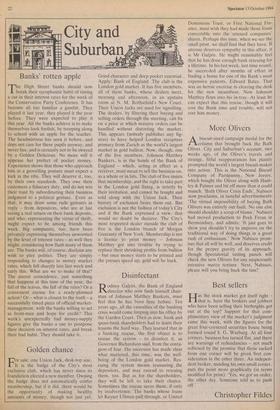Disinfectant
Rodney Galpin, the Bank of England director who now finds himself chair- man of Johnson Matthey Bankers, must feel that he has been here before. Ten years ago, all the casualties of the banking crisis would come limping into his office by the Garden Court. Then as now, bank and quasi-bank shareholders had to learn their lessons the hard way. They learned that in a banking rescue, the first object is to rescue the system — to disinfect it, as Governor Richardson said, from the conta- gion of fear. His successor has made clear what mattered, this time, was the well- being of the London gold market. Res- cuing the system means reassuring the depositors, and may extend to rescuing them, too. But as for the shareholders, they will be left to take their chance. Sometimes the rescue saves them, if only by inadvertence. The banks whose loans let Keyser Ullman pull through, or United Dominions Trust, or First National Fin- ance, must wish they had made those loans convertible into the rescued companies' shares. Perhaps this time, when we see the small print, we shall find that they have. If anyone deserves sympathy in this affair, it is Mr Galpin. He might reasonably feel that he has done enough bank rescuing for a lifetime. In his last week, last time round. he succeeded after months of effort in finding a home for one of the Bank's most expensive patients, Edward Bates. That was an heroic exercise in clearing the desk for the new incumbent. Now Johnson Matthey flops into his in-tray. At least he can expect that this rescue, though it will cost the Bank time and trouble, will not cost him money.






















































 Previous page
Previous page